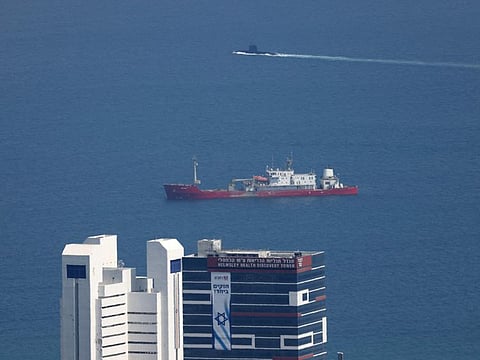US beefs up Middle East forces before Gaza truce talks set to start in Doha on August 15
Ceasefire deal could be enough to persuade Iran, proxies to hold off on promised attacks

Dubai: The US is ramping up its naval and air forces in the Middle East to bolster Israel against potential Iranian attacks amid simmering tensions in the region just as Gaza ceasefire talks are set to resume on August 15.
Secretary of Defence Lloyd Austin has expedited the arrival of the USS Abraham Lincoln carrier group, which includes F-35C fighters, to the region and has also deployed the guided-missile submarine USS Georgia.
The decision follows a call with Israeli Defence Minister Yoav Gallant aims to strengthen Israeli defences and potentially deter Iran.
Iran, along with its Hezbollah proxy, has threatened retaliation for the recent assassinations of key militants in Beirut and Tehran.
Iran’s acting foreign minister Ali Bagheri Kani has reiterated the country’s intent to retaliate against Israel for the death of Hamas leader Ismail Haniyeh. The US is keen to prevent a major escalation, particularly with a presidential election approaching in three months.
The development comes as Lufthansa said it was extending the suspension of flights to Tel Aviv, Tehran, Beirut, Amman and Erbil through to August 21.
It would also avoid using Iranian and Iraqi airspace until August 21, an extension from a previous date of August 13.
Air France and its subsidiary Transavia France also extended the suspension of their flights to Beirut, through Wednesday August 14.
The flights have been suspended since July 29 and their resumption “will be subject to a new assessment of the situation on the ground”, Air France said in a statement. The French carrier continues to serve Tel Aviv’s airport.
Other airlines have also modified their flight schedules in the region recently.
Tensions have soared as Iran and its allies vowed revenge for the high-profile killings of Hezbollah’s top military commander Fuad Shukr in Lebanon and Hamas chief Ismail Haniyeh.
Hezbollah has been exchanging near-daily fire with Israeli forces across the border between Lebanon and Israel.
Great concern about spiral of violence
German Chancellor Olaf Scholz on Monday expressed “great concern” about the “spiral of violence” in the Middle East in a phone call with Iranian President Masoud Pezeshkian, his spokesman Wolfgang Buechner said.
Scholz “appealed to President Pezeshkian to do everything possible to prevent a further military escalation”, expressed “great concern about the danger of a regional conflagration in the Middle East” and said “the spiral of violence in the Middle East must be broken now”.
The US, Qatar and Egypt last week called for a new round of Gaza ceasefire talks on August 15, an effort to resolve long-deadlocked negotiations between Israel and Hamas more than 10 months into their war.
Hamas has pushed back against the proposal, saying discussions should center on implementing previous plans.
France, Germany and the UK endorsed the plan for talks on Monday and urged Iran to refrain from attacks.
Doha talks
Israel has agreed to attend the talks. One Israeli official said they would take place in Doha with focus on whether Hamas might relent on truce terms, according to Bloomberg.
Another Israeli official said the Arab mediators would confer with Hamas afterward. Israel has not yielded on its main terms, said the officials, who spoke to Bloomberg on condition of anonymity given the sensitivity of the issue.
Hamas triggered the Gaza war when its militants invaded Israel on October 7, with Lebanon’s Hezbollah and the Yemen-based Houthis engaging in rocket-fire battles in solidarity.
All three groups are sponsored by Iran and designated terrorist organisations by the US.
Austin and Gallant discussed “efforts to deter aggression by Iran, Hezbollah and other Iran-aligned groups across the region and progress toward securing a ceasefire and the release of hostages held in Gaza, according to the statement from the the US Department of Defence.
Gallant’s office played up the “inter-operability” of Israeli and US military systems, indicating the allies would fight as a united front, Bloomberg news agency reported.
Previous rounds of ceasefire talks have been held up in part by Israel’s determination to resume fighting after any pause to ensure Hamas is totally destroyed. Hamas has demanded a total Israeli withdrawal from the coastal Palestinian territory it has run since 2007, now partially destroyed by months of war.
A deal that offers Hamas a reprieve could be enough to persuade Iran and its proxy groups to hold off on their promised attacks. But Israeli media has speculated a retaliation for the assassinations could come before the truce talks are scheduled to start.
Sign up for the Daily Briefing
Get the latest news and updates straight to your inbox



